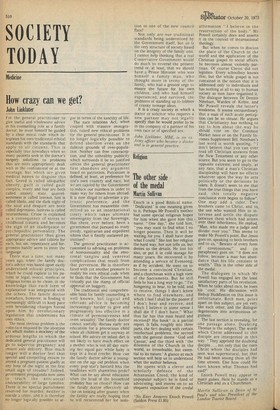Medicine
How crazy can we get?
John linklater
For the general practitioner to give useful and wholesome advice in his counselling role as a family doctor, he must himself be guided by a clear moral code which integrates his own traditional ethical standards with the standards that apply to all citizens. This is especially true nowadays when so many patients seek in the doctor's surgery solutions to problems that are more appropriately dealt with in the confessional or at the vicarage, but which are given medical names to disguise this fact. Greed is called idiopathic obesity, guilt is called guilt complex, worry and fear are both called anxiety state, quarrelsomeness is called tension, lust is called libido, and the dark night of the soul and despair are both called depression, laziness is called neurasthenia. Crime is explained as a consequence of stress or
O childhood trauma and becomes ill the sign of an inadequate or P! psychopathic personality. The I general practitioner thus gives
▪ appropriate advice and tablets for each, but sin, repentance and for
• giveness hardly seem to enter the ill language.
There was a time; not many ;11 years ago, when the family doc
▪ tor's advice was based upon easily
es understood ethical principles,
• which he could explain to his patient in legal, moral, medical or • religious terms as he chose, in the knowledge that each form of explanation was integrated with the others. The family doctor nowadays, however, is finding it increasingly difficult to keep pace with bewildering changes forced upon him by revolutionary legislation that undermines his own ethics.
The most obvious problem is the volte-face imposed by the abortion Act which makes a mockery of the arduous lengths to which the dedicated general practitioner will go to supervise pregnancy and ensure safe delivery. How much longer will a doctor feel that special and compelling reason to attend a pregnant patient gladly at any hour of the night at the first small sign of trouble? Indeed, government propaganda now aims to teach the anti-social undesirability of large families. There is no special punishment reserved for murder, neither is suicide a crime, and it is therefore no longer logically possible to ar gue in terms of the sanctity of life. The race relations Act, when coupled with massive immigration, raised new ethical problems for the general practitioner. It is no longer logically possible to defend abortion even on the dubious grounds of over-population. Neither can -free contraception, and the unhealthy publicity which surrounds it be so justified unless the general practitioner first abandons any argument based on patriotism. Patriotism is defined, at least, as preference for one's own country and race, but we are cajoled by the Government to reduce our numbers in order to make way for others from abroad. It is now illegal to advertise a pa triotic preference, and the Government has meanwhile committed us to an international treaty which takes ultimate sovereignity from the Sovereign. Has there, ever before, been a government that pursued so many trendy, egalitarian and expedient whims that it finally outlawed patriotism?
The general practitioner is accustomed to advising on problems of homosexuality and the emotional tangles and venereal complications that result from that perversion. He is therefore faced with yet another pressure to modify his own ethical code when he finds that the Government has virtually put the stamp of official approval on buggery.
The traditional and comprehensible basis for family counselling is well known, but logical and relevant advice is becoming increasingly harder to give and progressively less effective in a climate of permissiveness and overt sexuality. The family doctor cannot usefully discuss early sex education for a precocious child %'hen all children get it anyway at school. His advice on infant diet is not likely to have much effect on a mother who is out all day earning her equal pay while baby is kept in a local creche. How can the family doctor advise a youngster on the age old problem when every pop. star's bastard hits the headlines with shameless pride? What can he say about education when the head of the household probably has no choice? How can the family doctor effectively advise on looking after granny when the family are really hoping that he will recommend her for isola
tion in one of the new council flats?
Not only are our traditional standards being undermined by the Government itself, but so is the very structure of society based on the integrity of the family unit. I cannot help thinking that a real Conservative Government would do much to reverse the present trend or, at least, that we should have a Prime Minister who was himself a family man, who thought more in terms of the family, who had a greater urge to ensure the future for his own children, and who had himself experienced, and survived, the problems of standing up to lobbies of cranky teenage ideas. It is a crazy society in which a doctor or solicitor who requires a new partner may not legally specify that he would prefer to be in the company of a partner of his own race or of specified sex.
John Linklater, MBE, is an exArmy officer who became a doctor and is in general practice.


































































 Previous page
Previous page